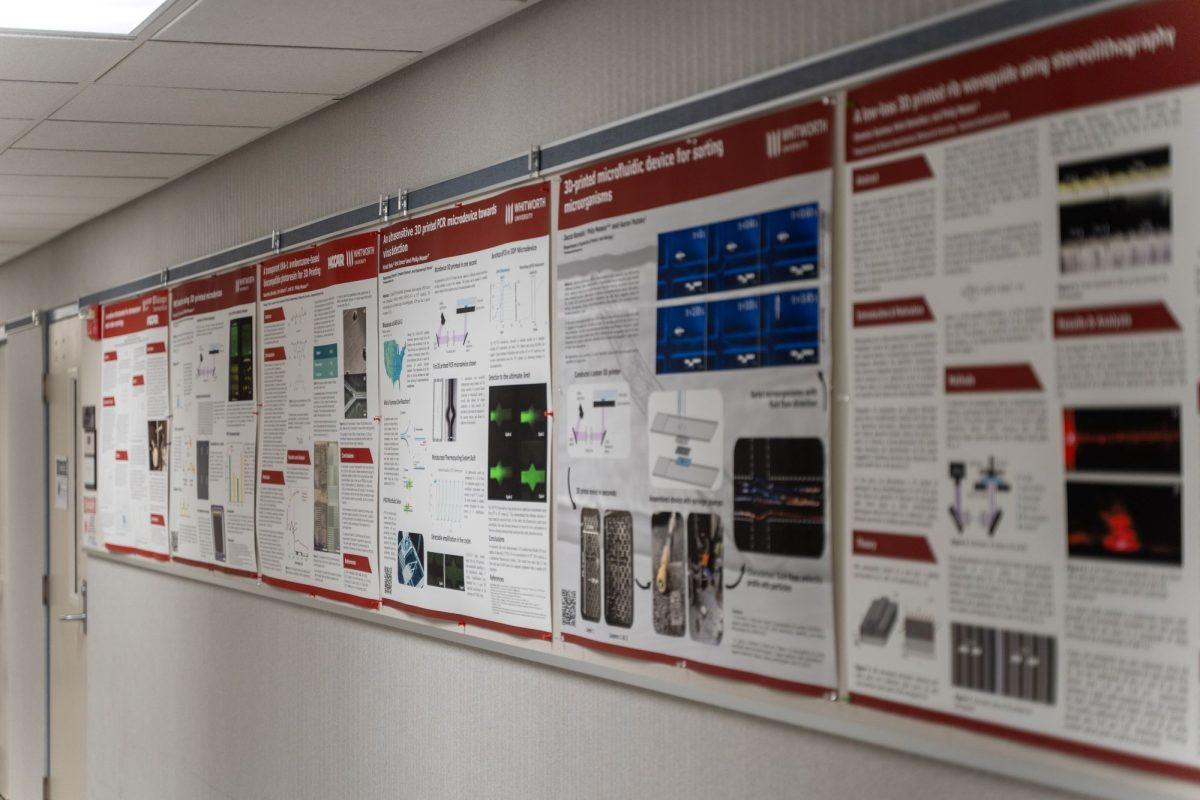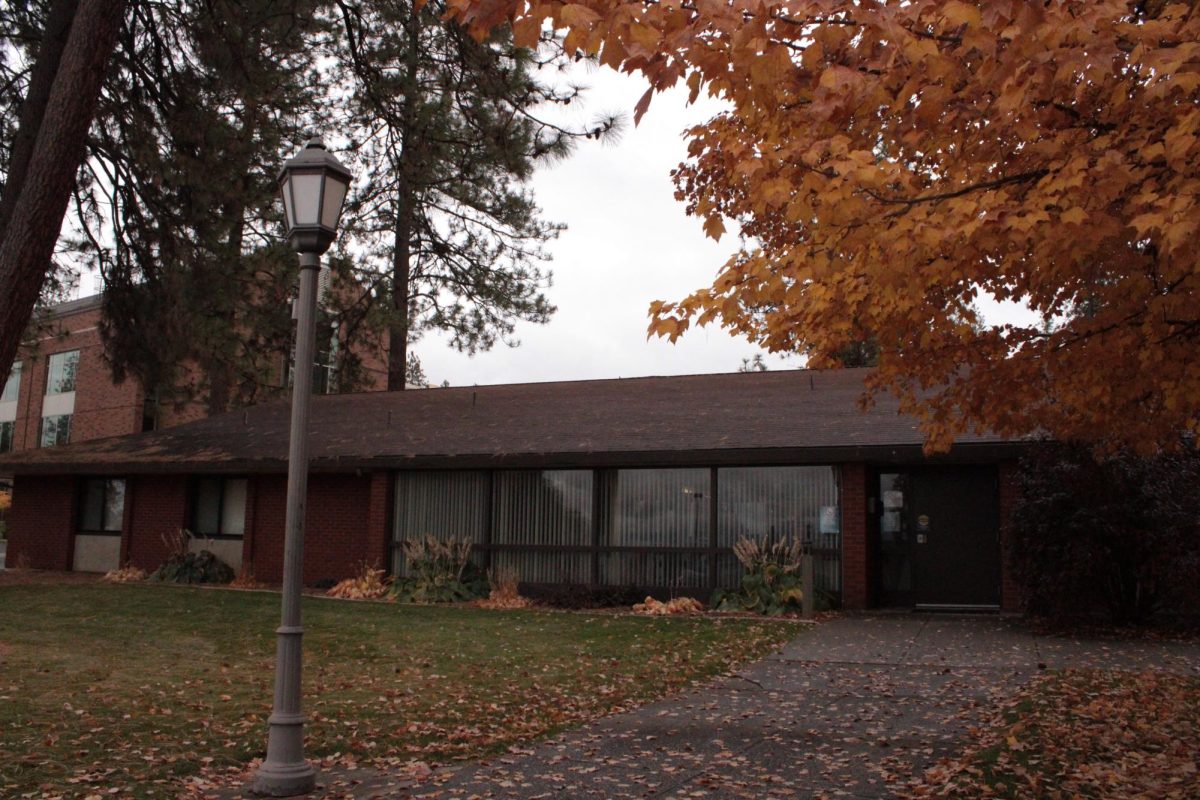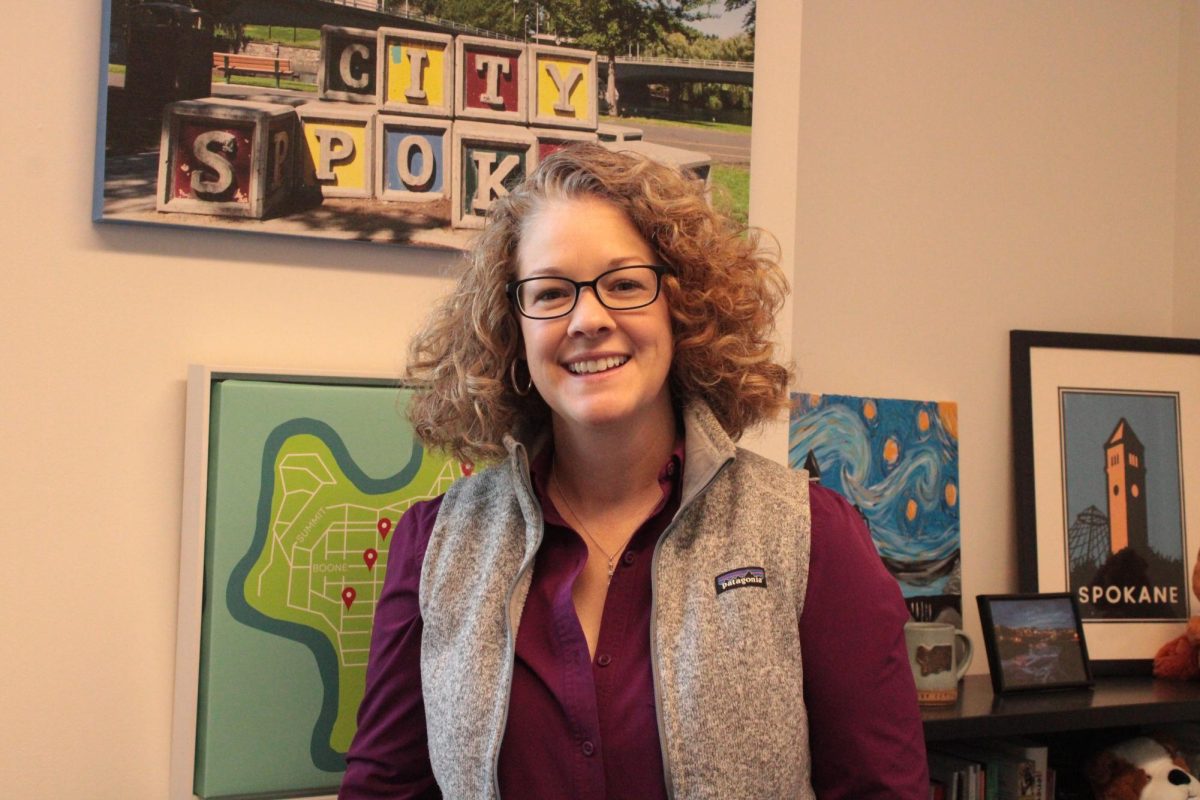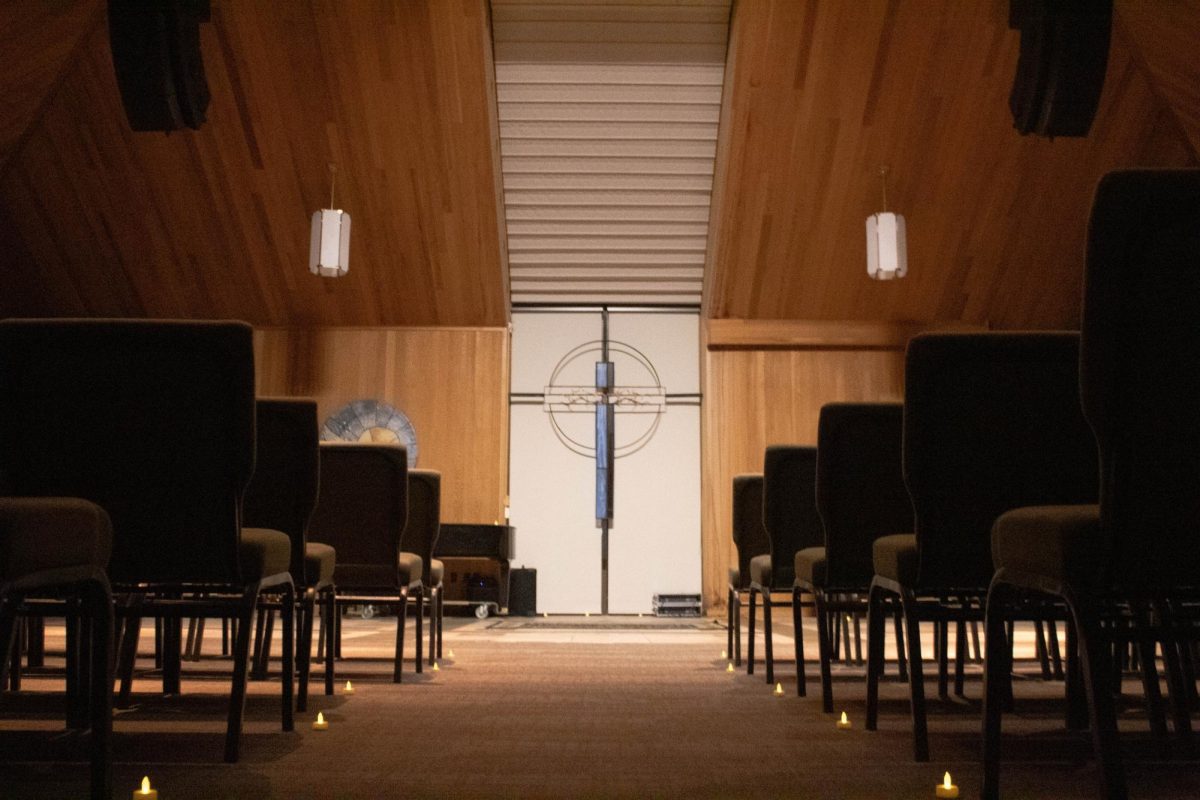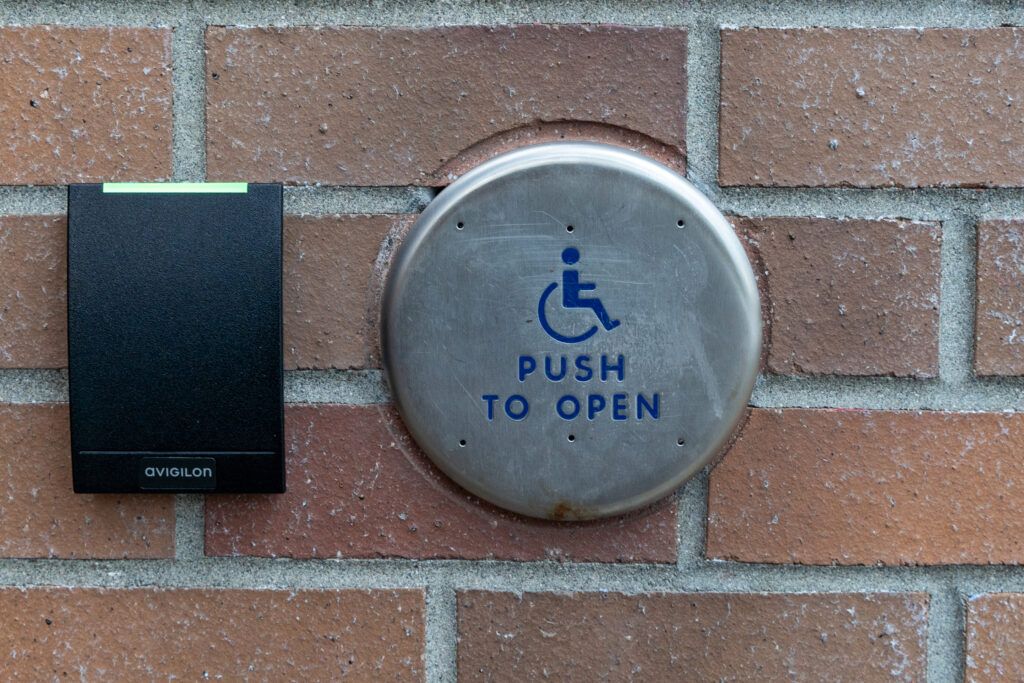
For some students at Whitworth University, like senior sociology major Sitara Busby, the process of getting accommodations through Whitworth’s Educational Support Services (ESS) was incredibly easy.
When Busby applied to Whitworth, she stated in her application that she would need accommodations and provided her doctor’s note on campus. ESS then called her and gave her a list of accommodation options to pick from.
How ESS Works
Whitworth’s ESS office is where students can get accommodations. The first thing students need to do is fill out an intake form and provide ESS with documentation of their relevant diagnosis. Second, students have an intake interview with Katie McCray, disability support and service manager, to decide what accommodations can be provided.
Third, ESS verifies that the student’s diagnosis affects them in the academic and/or personal setting. Then, ESS affirms that the requested accommodation follows the standards of the academic program. For example, the accommodation can’t do things like allowing for grading scales to be adjusted or academic requirements to be negated. The accommodations are also evaluated to ensure they do not “cause an undue burden on the school,” said McCray.
Once that process is complete, accommodations are then written out in an accommodation memorandum that is sent to the student and the student’s professors every term.
Busby described her experience of getting accommodations approved as “pretty simple.” However, she faced trouble with using them when some professors would not allow her to use the approved accommodations. Because the accommodations were not “enforced in classrooms,” Busby said she had to be her “own advocate.”
Being your own advocate for your disability can be difficult, especially due to the stigma attached to disabilities, explained Busby.
“I think a lot of us just like to slide by and try to do our best because it’s scary confronting your professor who’s in charge of your grade,” said Busby.
She did not bring up these challenges with ESS, but “probably should have,” said Busby.
While Busby faced difficulties in having her accommodations met, some students face barriers to getting their accommodations approved at all. “Trying to get accommodations was like trying to pull teeth. I got told, ‘we’re working on it,’ every day for five months,” said Carmen Ludeman, a Whitworth student during the 2021 fall semester, despite providing doctors notes and evidence of her medical diagnoses.
Ludeman’s accommodations were necessary due to severe asthma and life-threatening allergies. When these needs were unmet, she simply “had to go without,” said Ludeman, which resulted in several medical emergencies and ambulance calls.
Ludeman was not told why her accommodations were not provided, despite the fact that she provided proof of her medical diagnoses.
“[I] felt ignored. I felt like nothing I was saying was being heard and I was just being written off. The whole experience was frustrating,” said Ludeman.
There are a lot of reasons students’ accommodations may take time to be approved, such as disengagement or communication errors, explained McCray. But these leave some students having to go without necessary accommodations, as was Ludeman’s case.
ESS in Comparison
Whitworth’s ESS is quite different from Gonzaga University’s Disability Access Program (DAP), housed under the Center for Student Academic Success.
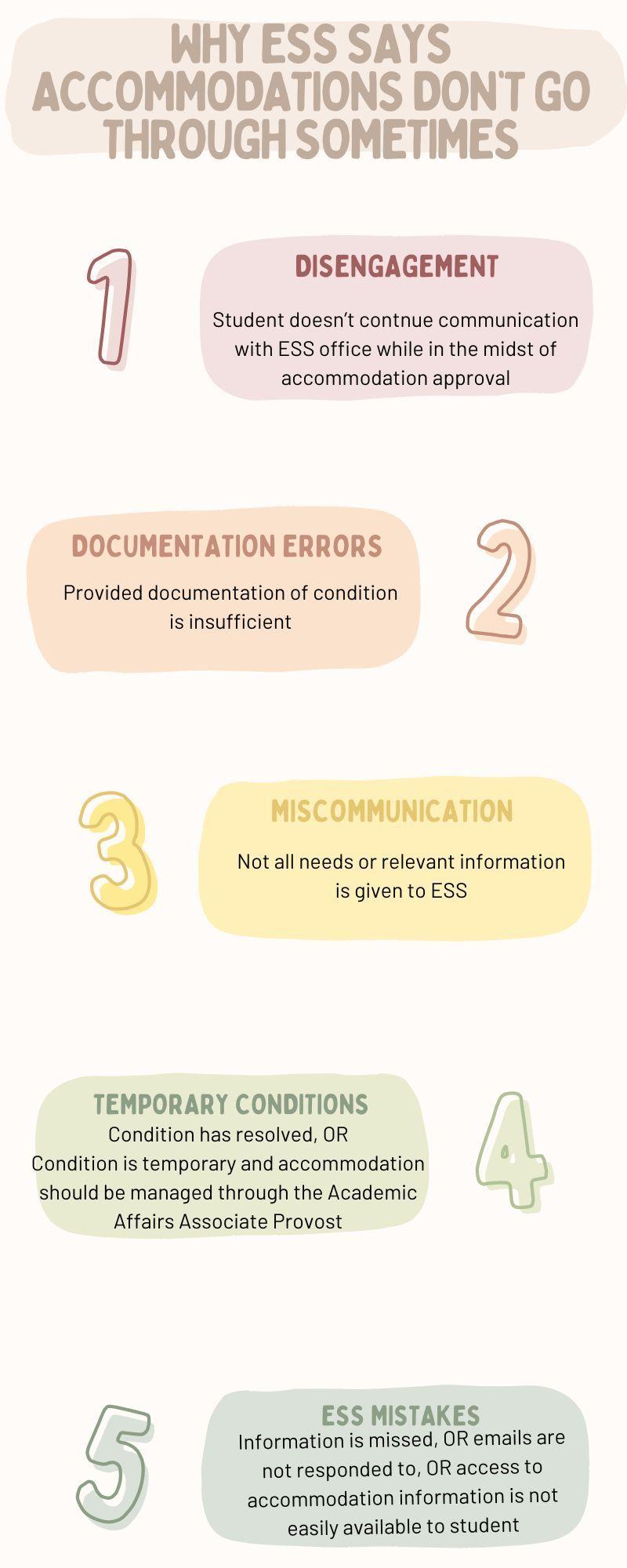
Just like ESS, the DAP follows the Americans with Disabilities Act (ADA), serving anyone who needs accommodations. But unique to Gonzaga, “Since the campus is relatively accessible, there’s a number of let’s say wheelchair users who don’t ever come talk to us. They’re not really disabled in our environment in that sense,” said Jason Varnado, Gonzaga’s associate director of disability access. For example, all Gonzaga’s residence halls have at least one ADA accessible room.
This contrasts with Whitworth’s residence halls. Only two of the nine residence halls, Duvall Hall and Oliver Hall, are fully accessible. These halls include elevators leading to the laundry rooms, which are usually in the basements of each hall.
The process students undergo to establish and update their accommodations at Gonzaga is also different from Whitworth. Gonzaga uses a system to manage all of their accommodations which allows for a lot of student interaction.
This system includes an online application for students seeking accommodations. Documentation of diagnosis is only submitted if necessary, and it is not required if a student’s diagnosis is easy to see.
“If something’s readily apparent, for instance a student who uses a wheelchair, … we don’t need documentation for them,” said Varnado.
Even if the DAP office is waiting for official medical documentation, they still meet with the student to discuss their options. This is different from Whitworth, which requires documentation to be provided before scheduling any accommodation meetings. Without proper documentation, the accommodation process stops.
At Gonzaga, however, “We take the student’s narrative. That’s considered documentation as well,” said Vicki Weaver, a specialist in the Gonzaga DAP office.
This means that while a doctor’s note may be required, personal experience is also valuable information. DAP lets students explain what has worked well for them in the past, and what has not. That way, they receive the accommodations that will be most suitable for their specific needs.
“We never want a student to feel that they can’t come in and meet with us with minimal documentation,” said Weaver. “We don’t want them to feel that we’re not listening. So, we’ll invite them in to talk anyway.”
After documentation is provided by students, the DAP looks over the application and matches what the student needs to what can be provided. Later, students can also decide what professors receive their accommodation information. Rather than sending the whole accommodation memorandum to the student’s professors via email, as Whitworth does, “[The student is] in control and that’s the first thing we tell any new student,” said Weaver. “It’s up to [them] to manage [their] accommodations.”
“We assume that the student knows their condition best,” said Varnado. ”We go from that point instead of our assumptions about what they may or may not need.”
For Zachary Edge, a first year at Gonzaga University, the accommodations process is working well. After contacting Megan Farley, Gonzaga’s second access and accommodation specialist, Edge was able to get exactly what he needed.
“It was actually very easy [to get the accommodations] and that’s kind of surprising because sometimes it has been hard in the past,” said Edge. “But I think Gonzaga does a very good job of trying to meet the needs of all different kinds of people.”
Once students have been given their accommodations, they are still encouraged to reach out if they need any further assistance. “We do tell students, ‘If something’s not working, you need to come tell us right away. If a faculty member [is] not doing what they’re supposed to be doing, you need to come tell us right away. I do know that students don’t do that always. Maybe they’re afraid of the faculty member, or they don’t want to bother us … They do worry about those things,” said Varnado.
Of course, nothing is perfect. Edge has experienced difficulty this semester with one of his professors who was not following through on the accommodations Edge needed for the class. The situation ended in him dropping out of the class entirely, and he plans to take it again next semester.
The Potential Future of ESS
McCray sees that there are ways that Whitworth’s ESS could improve, and she has hope for the future.
A long-term, optimistic goal for ESS is to see “an inclusive world where things are built and designed for universal access,” said McCray.
For McCray, this would look like universal design where the curriculums and classrooms are inherently designed to work “for all types of learning.”
To her, the ultimate accessibility experience would be one in which “there isn’t a need for an accommodation office. There isn’t a need for this process to identify and apply for accommodations. It’s just ‘I go into the classroom, and I can learn because I can use these tools. The teacher’s presenting all information in all these different ways, and I can express my learning in all these different ways,'” said McCray.
At Whitworth this could include either “Standardize it. Do it the same way,” or, “If there is the freedom to structure your Blackboard, take the time together in class with your laptops [to go over it],” said McCray. Her ideal is that accommodations do not require any application process, but that they are simply there for students to use whenever needed for success at Whitworth.




